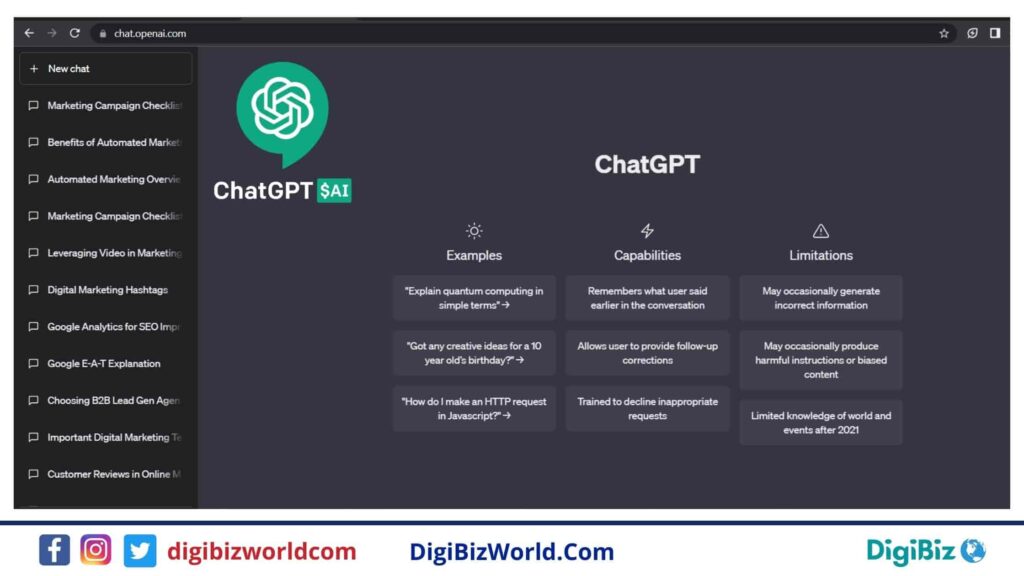What is ChatGPT? Everything you need to know about ChatGPT

ChatGPT is a large language model created by OpenAI based on the GPT-3 architecture. It is an artificial intelligence system designed to generate human-like responses to natural language inputs. The system is trained on massive amounts of text data and uses deep learning algorithms to understand and generate language.
ChatGPT has been trained on various tasks, including text completion, language translation, question-answering, and more. It can be used for various applications, such as chatbots, virtual assistants, and content generation.
How ChatGPT Works
The natural language processing model uses deep learning techniques to generate human-like responses to text inputs.
Pre-training: ChatGPT is first pre-trained on a large corpus of text data, such as Wikipedia articles or books, using unsupervised learning.
Fine-tuning: After pre-training, ChatGPT is fine-tuned on a specific task or domain, such as answering customer support questions or generating chatbot responses.
Encoding: When a user inputs a text prompt or question, ChatGPT encodes the text into a numerical representation using a process called tokenization.
Processing: The encoded input is passed through multiple layers of transformer neural networks, which process the text inputs and generate a probability distribution over the possible responses based on the input.
Decoding: The output of the transformer network is a series of numerical tokens that represent the most likely response to the input.
Response generation: Once the numerical tokens have been decoded back into text, ChatGPT generates a response based on the highest probability output from the transformer network.
ChatGPT can provide fast and accurate responses to user inquiries without the need for human intervention and has the potential to improve user engagement and satisfaction.
How can we use ChatGPT?
There are several ways to use ChatGPT (Generative Pre-trained Transformer) to generate human-like responses to text inputs. Here are some examples:
Answering questions: You can ask ChatGPT a question on any topic, and it will generate an answer based on its understanding of the topic.
Chatbots: ChatGPT can be used to create chatbots that can provide customer support, answer common questions, or engage in casual conversation with users.
Virtual assistants: ChatGPT can be integrated into virtual assistants, such as Amazon Alexa or Google Assistant, to provide more intelligent and natural language responses to user inquiries.
Language translation: ChatGPT can be used for language translation by inputting text in one language and generating a response in another language.
Content creation: ChatGPT can be used to generate content such as news articles, product descriptions, or marketing copy, based on a prompt or specific input.
Summarization: You can input a long text, and ChatGPT can generate a summary that captures the main points of the text.
Text completion: ChatGPT can be used for text completion by providing a partial sentence or phrase and allowing the model to generate the rest of the text.
To use ChatGPT, you can access a pre-trained version of the model through an API, or you can fine-tune the model on a specific task or domain with your data.
How Chatgpt Helpful for Humans
ChatGPT can be helpful for humans in several ways. Here are a few examples:
Information and knowledge: ChatGPT can provide information and answer questions on a wide range of topics, helping people learn new things and expand their knowledge.
Language and communication: ChatGPT can assist with language and communication by providing suggestions and corrections to written text, helping people to communicate more effectively.
Saving time and effort: ChatGPT can save time and effort for humans by automating tasks such as content generation, translation, and summarization.
Productivity and time management: ChatGPT can assist with productivity and time management by providing reminders, scheduling appointments, and assisting with task management.
Mental health and well-being: ChatGPT can provide support and resources for mental health issues, such as anxiety and depression, and offer advice for maintaining good health and well-being.
Entertainment and leisure: ChatGPT can provide recommendations for movies, books, and other forms of entertainment, helping people find new and interesting things to enjoy.
Advancing research: ChatGPT can advance research in various fields by generating new insights or predictions based on large amounts of data.
Overall, ChatGPT can be incredibly helpful for humans by enhancing their creativity, efficiency, productivity, learning, and advancing research in various fields.
How ChatGPT Helps Different Industry
ChatGPT can potentially impact many industries, as it can process large amounts of data and generate human-like responses. Some of the industries that are likely to be affected by ChatGPT include:
Customer service: ChatGPT can assist with customer service by answering frequently asked questions and providing personalized recommendations to customers.
Marketing: ChatGPT can assist with marketing by generating content ideas, writing ad copy, and analyzing consumer data to help companies understand their target audience better.
Education: ChatGPT can assist with education by providing explanations and answering questions on various subjects, helping students to understand concepts better and learn at their own pace.
Journalism: ChatGPT can assist with journalism by generating news stories and reports based on data and trends.
Finance: ChatGPT can assist with finance by providing investment advice, answering questions on financial products, and analyzing market trends to help people make better financial decisions.
Healthcare: ChatGPT can assist healthcare professionals by analyzing patient data, communicating with them, providing diagnoses, and even assisting with surgeries in the future.
Overall, ChatGPT has the potential to revolutionize many industries by providing intelligent automation, streamlining processes, and reducing the need for human intervention in some cases.
Jobs That ChatGPT Could Potentially Affect
ChatGPT could potentially impact a wide range of jobs in the future. Here are some jobs that could be impacted by ChatGPT:
Legal research: ChatGPT can assist with legal research by analyzing case law and generating summaries, potentially impacting the role of legal researchers.
Academic research: ChatGPT can analyze research papers and generate summaries, potentially impacting the role of academic researchers.
Financial analysis: ChatGPT can analyze market trends and provide investment advice, potentially impacting the role of financial analysts.
Medical diagnosis: ChatGPT can analyze patient data and provide diagnoses, potentially impacting the role of medical diagnosticians.
Human resources: ChatGPT can screen job applications and provide recommendations, potentially impacting the role of human resource professionals.
Translators: ChatGPT could be used to translate text from one language to another, potentially replacing human translators in some cases.
Content creators: ChatGPT could be used to generate content such as news articles, product descriptions, or marketing copy, potentially replacing human writers in some cases.
It is important to note that ChatGPT is designed to automate some tasks, but it is not capable of replacing human workers entirely. In many cases, human workers will still be needed to perform tasks that require emotional intelligence, creativity, and critical thinking. Additionally, new jobs may be created as a result of the increased use of ChatGPT and other AI technologies.
What is the Future of Chatgpt and AI Chatbot
Artificial intelligence chatbots have come a long way in recent years, and the future of ChatGPT and AI chatbots is looking bright. As language models like ChatGPT become more sophisticated, chatbots will be better equipped to understand and respond to human language.
Here are a few potential developments we may see in the future:
Improved natural language understanding: As language models like ChatGPT continue to improve, AI chatbots will become better at understanding and generating natural language responses. This could lead to more seamless and intuitive conversations between humans and AI.
Personalization: AI chatbots could become even more personalized to individual users, leveraging data such as their preferences, past interactions, and social media activity to generate tailored responses and recommendations.
Integration with other technologies: AI chatbots could be integrated with other technologies, such as voice recognition and augmented reality, to create even more immersive and interactive experiences.
Improved emotional intelligence: As AI chatbots become better at understanding natural language, they may also become better at understanding and responding to human emotions. This could lead to more empathetic and human-like interactions with users.
More complex tasks: As AI chatbots become more sophisticated, they could take on more complex tasks, such as financial analysis, medical diagnosis, and legal research. This could lead to increased efficiency and cost savings in a wide range of industries.
Overall, the future of AI chatbots is very promising. As technology continues to evolve, chatbots will be able to perform a wide range of tasks more efficiently and accurately than humans. The possibilities for AI chatbots are truly endless, and we can expect to see exciting developments in this field in the years to come.
Source: OpenAI’s ChatGPT model







